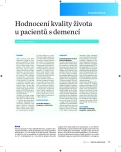Evaluating quality of life in patients with dementia
Authors:
MUDr. Milan Stolička 1; PhDr. Radka Bužgová, Ph.D. 2
Authors‘ workplace:
Léčebna dlouhodobě nemocných Klokočov
1; Ústav ošetřovatelství a porodní asistence
LF MU a FN Ostrava
2
Published in:
Geriatrie a Gerontologie 2014, 3, č. 4: 153-158
Category:
Original Article/Study
Overview
The aim of the research was to identify the most common negative symptoms in patients with late stage dementia and their quality of life during their hospitalization in the Long-term care institution Klokočov. Another aim was to find out whether the significant differences in the observed data were statistically repeated in the measurements. The group included 105 patients with end-stage dementia hospitalized in Long-term care institution Klokočov. For data collection in patients with dementia were chosen following tools: Qualid (Quality of life in late-stage dementia scale) and SM-EOLD (Symptom Management at the End-of-Life in Dementia).
Results:
In the second measurement to achieve better overall score in the scale of QUALID - quality of life of respondents improved. The most frequently reported symptoms were pain and shortness of breath. The frequency of their occurrence in the second measurement decreased. Other frequently occurring symptoms of the depression, and anxiety. Incidence of depression in the second measurement unchanged. Sadness for no apparent reason was given by 2/3 of the respondents. For three quarters of the respondents were recorded your meal at least 1 day. More than 2/3 of respondents did not prevent touches. For other symptoms (crying, restlessness, fear, grimacing, agitation, resistance to care and skin disorders) was observed a low rate.
Conclusion:
Evaluation instruments relating to negative symptoms and quality of life of seniors with severe dementia are based on the observation frequency of occurrence of these symptoms and assessment of the achieved score. Used assessment tools QUALID and SM-EOLD can be recommended for the evaluation of the negative symptoms and quality of life of older people with severe dementia.
Keywords:
late stages of dementia – symptoms, quality of life
Sources
1. Ústav zdravotnických informací a statistiky ČR (ÚZIS ČR): Zdravotnictví České republiky 2011 ve statistických údajích. Praha 2012. s. 7.
2. Weber P: Stárnutí populace a geriatrizace medicíny v ČR na prahu 3. tisíciletí. Česká geriatrická revue 2007; 5(1): 5.
3. Topinková E, Matějovská Kubešová H, Berková M: Evropa klade důraz na gerontologii a geriatrii. Praktický lékař 2012; 92(9): 520–523.
4. Vaňková H, Hradcová D, Jedlinská M, Holmerová I: Prevalence kognitivních poruch v pobytových zařízeních pro seniory v ČR – nárůst mezi lety 2007 a 2013. Geri a gero 2013; 3(2): 111–114.
5. Wija P: Jaká je kapacita a struktura dlouhodobé péče v České republice? Geri a gero 2013; 3(2): 122–127.
6. Jarolímová E, Nováková H: Význam podpůrné (svépomocné) skupiny pro rodinné pečující o seniora se syndromem demence. Geri a gero 2013; 3(2): 152–154.
7. Olmo JG, Pujol XP, Pousa SL et al.: Cross-cultural adaptation and psychometric validation of a Spanish version of the Quality of Life in Late-Stage Dementia Scale. Quality Of Life Research: An International Journal Of Quality Of Life Aspects Of Treatment, Care And Rehabilitation 2010; 19(3): 445–453.
8. Parker D, Hodgkinson B: A comparison of palliative care outcome measures used to assess the quality of palliative care provided in long-term care facilities. Palliative Medicine 2011; 25(1): 5–20.
9. Mitchell SL, Teno JM, Kiely DK et al.: The Clinical Course of Advanced Dementia. The New England Journal of Medicine 2009; 1529–1538.
10. Rexach L: Palliative medicine and care: Palliative care in dementia. European Geriatric Medicine 2012; 3(2): 131–140.
11. Kunz M, Lautenbacher S, Niewelt BG: The facial expression of pain in patients with dementia. Pain 2007; 133(1–3): 221–228.
12. Bužgová R, Zeleníková R: Vytvoření měřícího nástroje pro hodnocení potřeb pacientů v paliativní v souvislosti s kvalitou života: Hodnocení potřeb pacientů v paliativní péči (PNAP). Ošetřovatelství a porodní asistence 2012; 2 : 404–404.
13. Corbett A, Husebo B, Ballard C: Discomfort in dementia: identifying and managing pain. Nursing & Residential Care 2012; 14(9): 462–467.
14. Jarošová D, Šindelová K, Topinková E: Komplexní hodnocení seniorů v zařízeních dlouhodobé péče. Praktický lékař 2012; 92(7): 396–400.
15. Hendriks SA, Smalbrugge M, Hertogh CMPM, Van der Steen JT: Dying With Dementia: Symptoms, Treatment, and Quality of Life in the Last Week of Life. Journal of Pain and Symptom Management 2014; 47 : 710–720.
16. Mareš J: Spokojenost pacientů s poskytovanou péčí: metody a jejich použití. Praktický lékař 2009; 11 : 668–674.
17. Holmerová I, Baláčková N, Baumanová M a kol.: Strategie České alzheimerovské společnosti P-PA-IA. Geri a gero 2013; 3(2): 158–164.
Labels
Geriatrics General practitioner for adults Orthopaedic prostheticsArticle was published in
Geriatrics and Gerontology

2014 Issue 4
- Advances in the Treatment of Myasthenia Gravis on the Horizon
- Hope Awakens with Early Diagnosis of Parkinson's Disease Based on Skin Odor
- Memantine in Dementia Therapy – Current Findings and Possible Future Applications
- Possibilities of Using Metamizole in the Treatment of Acute Primary Headaches
-
All articles in this issue
- Evaluating quality of life in patients with dementia
- Quality of life of caregivers – family members of patients with severe dementia
- The reason of stress of senior living in home environment
- Nutrition in the elderly
- Iron deficiency related anaemia and geriatric medicine
- Normocytic and macrocytic anemia in the elderly
- Dehydration in the old age
- Thyreopathy in elderly patients
- Diabetes mellitus – geriatric syndroms, aims and therapeutic options in the elderly
- Adverse effects of NSAIDs on colopathies in older age
-
Paliative care of chronic heart failure:
When is it the right time? - Clostridium difficile – a dangerous pathogenfor older patients
- Geriatrics and Gerontology
- Journal archive
- Current issue
- About the journal
Most read in this issue
- Normocytic and macrocytic anemia in the elderly
- Dehydration in the old age
- Iron deficiency related anaemia and geriatric medicine
- Nutrition in the elderly
